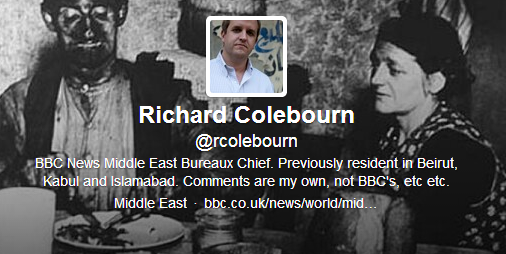On December 5th the Guardian’s Jerusalem correspondent Harriet Sherwood produced yet another article on one of her – and her employer’s – favourite subjects – the Bedouin. This time she appears to have made the short journey eastwards on Highway 1 from Jerusalem to the area between Ma’ale Adomim and Mitzpe Yericho which, as anyone who has traveled that route knows, is the site of numerous Bedouin encampments.

Once again, Sherwood apparently parrots the information fed to her by various interested parties without bothering to fact check.
“Around 20 bedouin communities between Jerusalem and Jericho are to be forcibly relocated from the land on which they have lived for 60 years under an Israeli plan to expand a huge Jewish settlement.”
Had Sherwood bothered to go back into the archives, she would have discovered that the members of the Jahlin tribe have been warned by successive Israeli governments that they would have to move from land they have been squatting upon since the 1980s due to the fact that it has been located within the municipal region of Ma’ale Adomim since 1977.
With a little research, Sherwood would also have discovered that the Jahlin have no legal claims to the ownership of this land, as admitted by one of the tribe’s leaders to the Los Angeles Times as far back as 1994, and that the Israeli government has repeatedly offered a solution to the problem, most recently in 2009.
“Nevertheless, out of sympathy for the plight of the Jahalin tribe, the Israeli government offered them title to a plot of land if they would agree to leave their encampment near Maale Adumim. This new site is about one kilometer from and more than five times larger than the Jahalin’s previous encampment. In addition, under the proposed agreement with the Jahalin, the Israeli government agreed to provide, at no charge, electricity and water hookups, cement building platforms and building materials.
Not surprisingly, the leaders of the Jahalin tribe accepted Israel’s offer and most of the tribe moved to the new site. The electricity and water hookups were provided, and the platforms were built. However, when a lawyer representing some of the Jahalin returned from a trip abroad and heard of the agreement, she convinced several of the Jahalin families who had not yet moved to stay where they were.”
Despite the fact that this has been an ongoing issue for well over 20 years, (and not to mention the logistical difficulties of postal communication, as obvious from the above photographs taken three months ago) Sherwood goes on to claim that:
“The communities have not been formally notified of the plan, which was disclosed by Israel‘s civil administration, the military body governing area C, to a UN agency.”
Next, Sherwood tries her hand at an emotive exercise in ‘compare and contrast’, completely ignoring the fact that no Western country (including the UK) which abides by planning rules provides services such as power, water or roads for illegal squats :
“The tiny communities perched on the bleak rocky hills which roll down towards the Dead Sea endure a harsh existence without electricity, running water, sanitation, paved roads and medical facilities. The bedouin homes are makeshift structures of wood, corrugated iron and tarpaulin.
The nearby Jewish settlements, in contrast, are connected to utilities and services. Ma’ale Adumim, home to almost 40,000 people and which overlooks the Jahalin communities, has 21 schools, 80 kindergartens, a public transport network, libraries, swimming pools and shopping malls.”
After that, a little politically-charged historical revisionism:
“The Jahalin were originally from the Negev desert, from which they fled or were forced out following the creation of the state of Israel in 1948. Now the extended tribe is scattered across the West Bank.”
Sherwood may care to purchase a copy of Henry Baker Tristram’s ‘The Land of Israel’, written in 1865, in which (chapter 9) he recounts how, in preparation for a journey from Jerusalem to the Dead Sea, his party “signed agreements with the Bedouin Sheikhs, who took it upon themselves to guard us and guide us along the way”, including “Abu Dahouk, the Sheikh of the Jahalin tribe which sits south-east of Hevron”.
Sherwood quotes her interviewee, adding her own interpretations of ‘international law’ as is her usual practice:
“They want to empty the bedouin from the whole area, and they will put settlers in our place, and there will be no Palestinian state,” said Hamis. All Jewish settlements in the West Bank and East Jerusalem are illegal under international law.”
The fact is, however, that Ma’ale Adomim is one of the areas which will undoubtedly remain under Israeli control in the event of the signing of a peace agreement with the Palestinian Authority.
The agenda which Sherwood is promoting in this article is that of the extremist elements which reject any kind of compromise necessary to enable such an agreement and, in fact, the timing of this article suggests that Sherwood has taken upon herself to act as a megaphone for one of the more politically-motivated organisations in the field.
In her article, Sherwood coyly refers to “a UN agency”. What she does not tell her readers is that on the very same day on which her article was published, UNRWA (99% staffed by local Palestinians) put out the following .
UNRWA is currently running a campaign – replete with some very questionable ‘facts’ – entitled “Don’t demolish my future“. Part of the campaign focuses upon the encampment at Khan al Ahmar – the very place from which Harriet Sherwood filed this latest report.
Was Sherwood’s trip to Khan al Ahmar in fact organized and facilitated by UNRWA? We may never know, but it seems like a distinct possibility, in particular as she repeats the UNRWA propaganda practically verbatim.
Guardian readers are probably quite capable of logging onto the UNRWA website themselves if they wish to read about the latest campaigns by this distinctly non-apolitical organization. One would expect a foreign correspondent worth his or her salt to do more than simply copy-paste the blurb put out by a notoriously one-sided organization, including the investment in some serious research and the presentation of the other side of the story.
The Guardian has publicly claimed that its coverage of Israel is “fair and balanced”. This article indicates yet again that it is neither.
Related articles
- Harriet Sherwood legitimizes Gazans’ complaints that they can’t enter Israel to sue the Jewish state (cifwatch.com)
- Peace activist’s home vandalized with death threats: Harriet Sherwood blames Bibi (cifwatch.com)
- Palestinian Guardian propaganda photo of the day (Soldier vs. child) (cifwatch.com)
- Harriet Sherwood’s latest Guardian report on terror attacks from Gaza redefines the word “Sporadic” (cifwatch.com)
- Guardian headline and report on Lebanese terrorist rocket fire into Israel blurs causation (cifwatch.com)








